Where Police and At-risk Youth Find Common Ground
The nonprofit NYC Together pairs officers with local students of color, altering perspectives and changing lives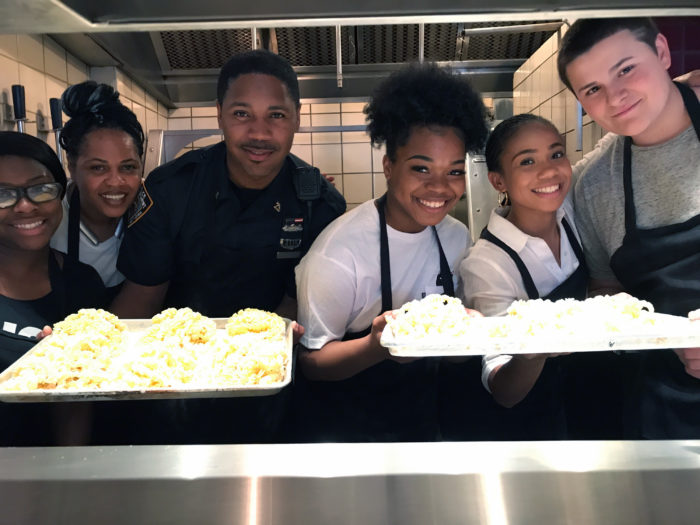
A cop and a cohort of students take on a baking project (Photos by Sue Kwon, courtesy of NYC Together)
One day in the spring of 2015, police officer Carlos Posada of Williamsburg’s 90th Precinct parked his NYPD-marked van in front of Automotive High School, his partner in tow. Instead of scooping up delinquents or using their mere presence as a mischief deterrent, these cops were at the school on a peacekeeping mission.
NYC Together, a Greenpoint-based social-justice organization that fosters civic engagement between the NYPD and students of color, had coordinated the visit. The plan was for the officers simply to get to know the youths a little better and allow them to explore some of the precinct house. But when Posada approached one group of students, the youngsters immediately put their hands behind their backs in surrender.
“I felt embarrassed,” says Posada, who was on his very first assignment with NYC Together that day. “I felt sad, even angry. But this is what they’re used to. This is what I’m guessing society says should be done whenever [they] encounter a police officer.”
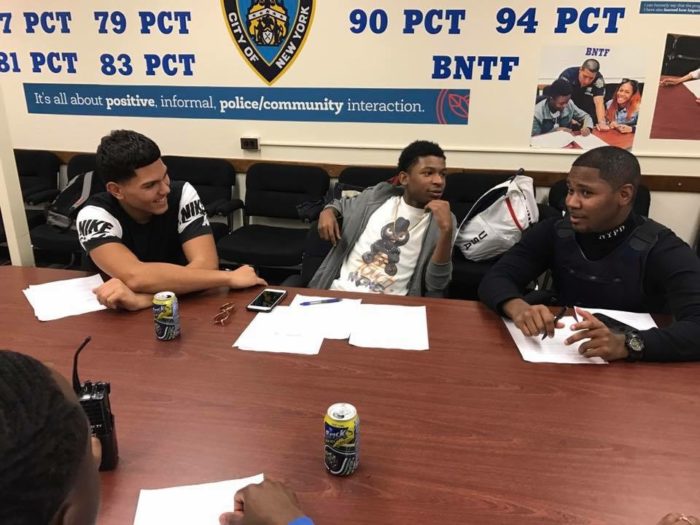
Students in the program meet with officers in the precinct houses, chat about issues, and launch community projects together
Posada quickly explained to the half-dozen students that he and his partner were there just to chat and present the precinct, he says, as “a safe space.” Posada played rap music in the van on the way to headquarters, and the kids found out they shared an appreciation for the genre with the officers. “Maybe they think all cops like country music?” Posada says he wondered. “I know I don’t.”
Slight gestures like those, coupled with the officers’ changing into plain clothes at the kids’ request, which prompted brow-raising surprise at the officers’ affinity for Air Jordan sneakers, helped create a connection between the two groups at the precinct, so often at odds on Brooklyn streets.
“We’re focused on interrupting the school-to-prison pipeline by positioning police officers to be part of this solution instead of the problem for young people who are experiencing challenges in school,” says NYC Together founder and president Dana Rachlin. Her organization assembles students from a particular school into “cohorts,” keeping them engaged with one another for at least a year while they address personal issues that range from rampant tardiness and absenteeism to trouble with coursework to behavioral problems.
“We know that, disproportionately to their white peers, black and brown students and students with disabilities [find] those behaviors get them suspended or expelled,” says Rachlin, who notes that in 2016, 99% of in-school arrests in New York City were levied against Hispanic and black students. The Civil Rights Data Collection organization also says black students are suspended at a rate three times higher than that of whites, and a study by the Brookings Institution reported that kids who get suspended are approximately 25% less likely to earn a high-school diploma, and are more likely to become impoverished adults.
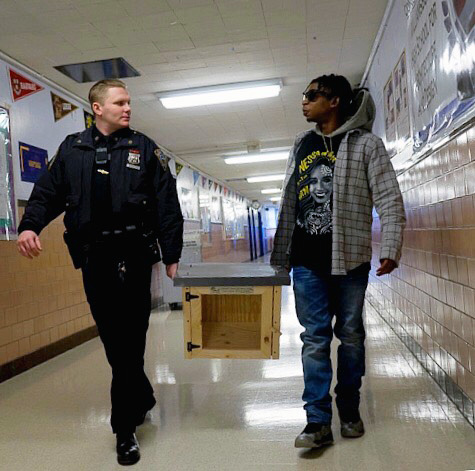
Officers learn their way around the schools as well, but with a different agenda than their law-enforcement role
Each of NYC Together’s student cohorts is matched up with a local precinct, where the students chat with officers and take on projects together. “We kind of reimagine the role of those police officers,” Rachlin says, adding that NYC Together can help fulfill recent promises from the NYPD and the Department of Education to become less punitive with troubled students. “Those policies are wonderful,” says Rachlin. “However, how do we bring policy to scale through action and education?”
Through NYC Together, the cops and the kids conduct weekly discussion groups, covering such issues as intergenerational poverty, gun violence, gentrification, and police-youth relations. Along with members of the community, the officers and students have collaborated to identify and plan neighborhood-focused service projects. In one instance, a student cohort and 90th Precinct officers volunteered to remove graffiti from local businesses and other neighborhood structures. They also prepared and served food to the hungry and led read-aloud sessions for local students.
Since NYC Together, a nonprofit that has raised money via private donors, was founded nearly three years ago, Rachlin says they’ve served more than 100 students. “We operate on just under $100,000 per year, which is truly remarkable for all that we accomplish,” Rachlin says. “It costs over $100,000 per year to incarcerate one young person, and here we are serving over 50 students per year, informally training police officers, and executing community-benefit projects.” NYC Together has created student cohorts at half a dozen North Brooklyn schools; each of those schools receives “Title 1” money, federal funds allocated for institutions housing a high percentage of “at-risk” students.
Rachlin says the organization has tried unsuccessfully to secure funding from the city’s Department of Education. Even without the DOE’s financial support, however, each high-school senior who has come through the program with at least a year of engagement has graduated, says Rachlin. Absenteeism among NYC Together students has dropped by an average 37%, she says, and their grade-point averages have risen.
At the same time, Rachlin asserts the organization is as beneficial to the police officers who get involved–from the 73rd, 77th, 79th, 88th, 90th, and 94th precincts–as it is to the students. “They have the opportunity to take a break from their regular radio runs,” Rachlin says of the officers. She points out too that police rarely learn of the fallout from a summons or an arrest. “Our young people are showing the officers how any kind of interaction [with police] can have a really serious impact on their lives,” she says.
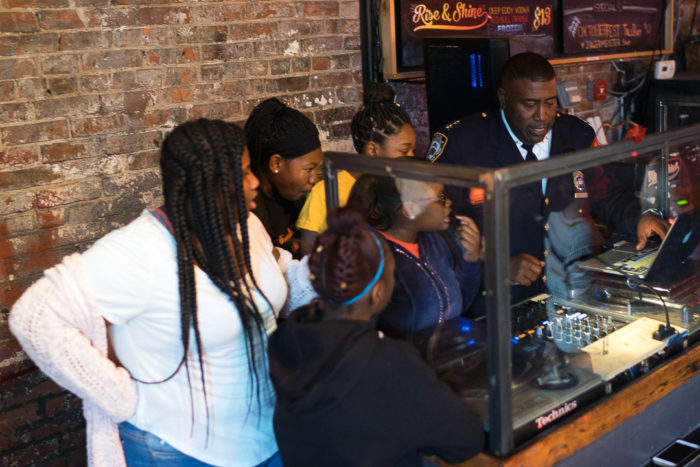
A NYC Together officer shares his DJ skills with the students
Officer Posada, for his part, says NYC Together has “opened up my eyes to see kids on a variety of levels. Their poverty affects their actions, the way they think,” he says. “It’s amazing to become a big brother, a father figure to a lot of these kids. Once they’re able to see that we truly do care about them, they open up to us.”
The nonprofit also connects young people with local business owners, securing them jobs befitting their personal interests. One NYC Together enrollee, Destiny Batista, an 18-year-old who has already graduated from the Frances Perkins Academy since starting the program, has worked at the Wythe Hotel for more than a year, under the guidance of owner Peter Lawrence. “Destiny started in the kitchen and worked as a prep cook for a couple months,” Lawrence says. “I wanted to make sure–because the hotel has many facets–that she spent time with some other folks. So she worked with the human resources department here and the accounting team that I have.”
Based on that experience, Batista told Lawrence the accounting work intrigued her most, and, according to Lawrence, she’s become a trusted, relied-upon member of the team that keeps the books.
Batista, a Brownsville resident, says she’s enjoying her role in the hospitality industry. “I’ve learned that going over your work is very important, because you might not get it right the first time,” she says. Batista is now studying accounting at LaGuardia Community College after Dana Rachlin coaxed her into applying. “I’m very fortunate to have a job like this and to be in school learning, because not all my brothers and sisters graduated high school, and I’m the first one to be in college, so I’m really thankful for Dana.”
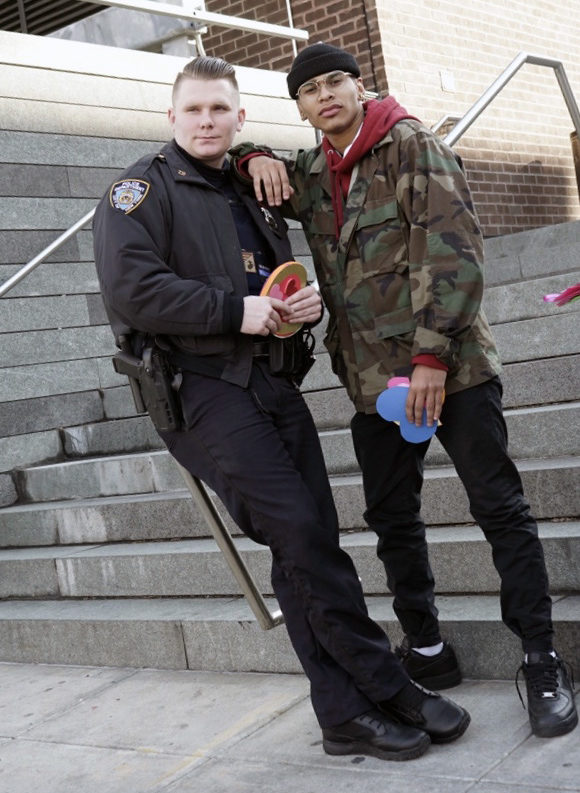
After time spent together, the officers find that the youths let down their guard and talk about their experiences
Lawrence admits to some trepidation upon the initial hiring of Batista, as he was worried breaking in such an inexperienced worker would be a distraction to his staff. To his delight, her hiring had the opposite effect. “Everybody who’s come into contact with Destiny has learned as much, or more, from her, about how the world really works, as we have offered to her,” says Lawrence says.
The hotelier’s experience mirrors something Officer Posada feels about his involvement with NYC Together as well. “You have your ‘thugged-out’ kid that doesn’t want to show emotion,” Posada says, describing youngsters he sees in the streets who appear to emulate gang members through dress and posture. “But this program has let these kids put down their own wall. When you put all that to the side, they’re sweet kids.”
“We are changing hearts and minds,” Rachlin says of her NYC Together team. “Literally that’s exactly what’s happening. We’re seeing shifts.”
(Video courtesy of NYC Together via Vimeo)
(Editor’s Note: Since filing this story, the writer has done freelance work for NYC Together.)










